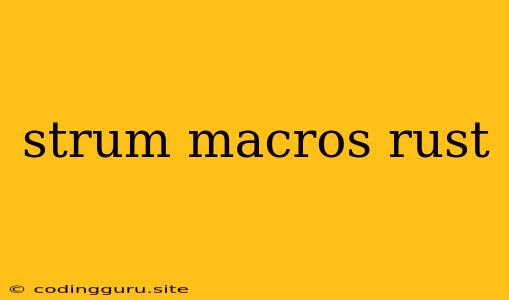Strum Macros in Rust: Simplifying Your Life
Have you ever found yourself writing repetitive code in Rust, especially when dealing with string manipulation or data processing? It's a common pain point for many developers, but fret not! Rust has a powerful tool in its arsenal to tackle this - macros. And among them, Strum macros stand out as a game-changer for handling string-related tasks.
What are Strum Macros?
Strum macros are a Rust library that provides a simple and efficient way to generate code for string-based enums. You can think of them as a handy shortcut for defining enums and their associated string values.
Why use Strum Macros?
- Code Reusability: Strum macros allow you to define your enums and their corresponding string values only once, eliminating the need for repetitive code.
- Reduced Boilerplate: Say goodbye to manually writing lengthy code for each enum variant. Strum macros handle the heavy lifting for you.
- Improved Readability: By using Strum macros, your code becomes cleaner and more understandable, especially when working with complex enums.
- Enhanced Type Safety: With Strum macros, you can ensure type safety for your string-based enums, reducing the risk of errors.
How do Strum Macros work?
Let's break down a simple example to see Strum macros in action:
use strum_macros::{EnumString, EnumIter};
#[derive(Debug, EnumString, EnumIter)]
#[strum(serialize_all = "kebab-case")]
pub enum Status {
#[strum(serialize = "active")]
Active,
#[strum(serialize = "inactive")]
Inactive,
#[strum(serialize = "pending")]
Pending,
}
In this example, we've defined an enum called Status with three variants: Active, Inactive, and Pending.
- The
#[derive(EnumString, EnumIter)]line tells the compiler to use theEnumStringandEnumItermacros from thestrum_macroscrate. - The
#[strum(serialize_all = "kebab-case")]attribute indicates how the enum variants should be serialized, in this case, using kebab-case (e.g., "active", "inactive", "pending"). - The
#[strum(serialize = "...")]attributes for each variant allow you to customize the serialization for individual cases.
Now, let's see how to use this enum:
fn main() {
let status: Status = Status::Active;
println!("{}", status.to_string()); // Outputs: "active"
println!("{:?}", Status::iter().collect::>()); // Outputs: ["active", "inactive", "pending"]
}
As you can see, we've used to_string() to convert the Active variant to its corresponding string representation. We've also used the EnumIter trait to iterate through all the enum variants and collect them into a vector.
Key Features of Strum Macros
- Serialization and Deserialization: Easily convert your enum variants to and from strings.
- Iteration: Iterate over your enum variants using the
EnumItertrait. - String Matching: Easily compare strings with enum variants using the
from_strmethod. - Custom Serialization: Fine-grained control over the serialization of your enum variants.
Integrating Strum Macros into Your Project
Adding Strum macros to your project is a breeze. You can add it as a dependency in your Cargo.toml file:
[dependencies]
strum = "0.19"
strum_macros = "0.19"
When to Use Strum Macros
Strum macros are ideal when:
- You need to work with string-based enums.
- You want to reduce code repetition.
- You prioritize code clarity and maintainability.
Conclusion
Strum macros in Rust are a powerful tool for simplifying the handling of string-based enums. They offer a streamlined approach to defining, serializing, deserializing, and iterating through your enums, leading to cleaner, more efficient, and type-safe code. By leveraging Strum macros, you can focus on the core logic of your application without getting bogged down in repetitive string-related tasks. So, embrace Strum macros and streamline your Rust development journey!
